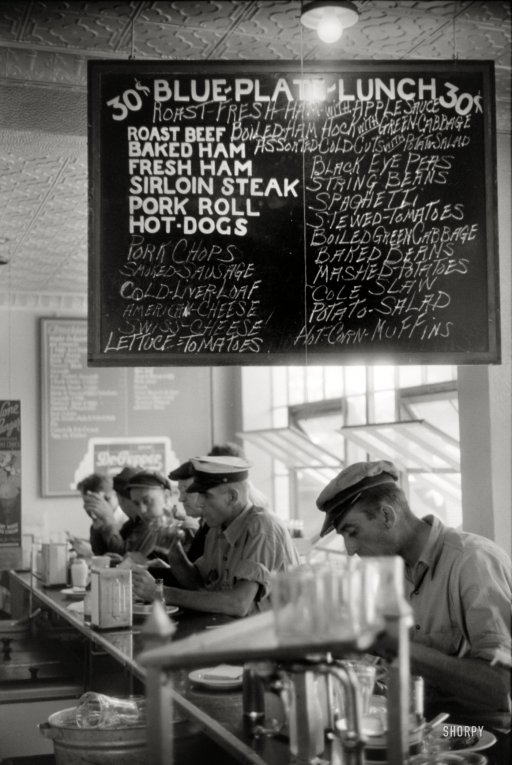
Jack Delano Cafe at truck drivers’ service station on U.S. 1, Washington DC 1940

Don’t be fooled. It’s just keystrokes slushing around. Nobody produced anything.
• Trump Bull Market Bounty Tops $1 Trillion (BBG)
Donald Trump is doing to U.S. equity bears what seven years of economic stimulus rarely could: shut them up. Two years of paralysis has for now ended in stocks, with more than $1 trillion added to shares values since Election Day and the DJIA looking bound for 20,000. Both the Dow and S&P 500 Index jumped to fresh records Wednesday, joined by transportation companies and small caps, while banks traded at eight-year highs. Wall Street stock forecasters, more pessimistic than any time since 2013 as recently as September, are suddenly falling over themselves to push up targets and explain a market where measures of anxiety are near five-year lows. The average call of bank prognosticators is for the S&P 500 to rally 3.4% next year, with strategists at JPMorgan and Bank of Montreal calling for even bigger gains.
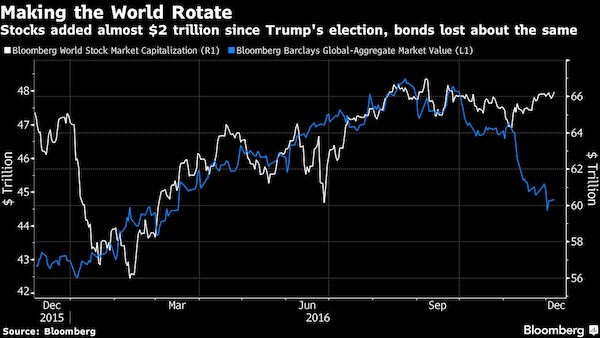
For investors, the question is how much credence to put in analysts whose futility in sussing out Trump’s impact on share prices was rivaled only by the inaccuracy of political polls prior to his victory. Not only has he not been the disaster many of them warned about, the rally since he defeated Hillary Clinton is now the biggest for any new president since Ronald Reagan. “What we didn’t expect was the speed and the magnitude of the so-called ‘Trump Trade,’” Doug Ramsey at Leuthold Group wrote. “The consensus hope, which we share, is that tax reform and regulatory roll-back will extend and maybe enliven an economic recovery that’s already long in the tooth.” To be sure, pinpointing Trump’s role in the rally is an inexact science, and a case could be made that his election is coinciding with the consummation of the Fed’s efforts. Among other things, annualized GDP rose 3.2% in the third quarter, the most in two years, while unemployment hit a nine-year low in November.

“..the great reflationary rotation trade..”
• Trump Win Set Off $2 Trillion Shock Rotation to Stocks From Debt (BBG)
Donald Trump’s election win sent a $2 trillion shock wave through global markets over the past month. That’s how much equities’ global market value has jumped. And that’s about the size of the loss in worth of the Bloomberg Barclays Global Aggregate Index of bonds, over the worst month for global bonds in dollar terms on record. Other assets were roiled, too: the yen plunged the most in 21 years against the dollar. It all amounted to a complete reversal of the playbooks mapped out by a bevy of analysts and investors who had anticipated a Brexit-style rush for havens in the event of a surprise Republican presidential victory. Those projections did pan out – for about eight hours, when the yen and Treasuries advanced as the vote-count momentum favored Trump.
Then the great reflationary rotation trade started, as Carl Icahn started snapping up S&P 500 futures and other investors decided that the likely new U.S. leader’s promises to cut taxes, boost spending and slash regulation would revive inflation and economic growth. Oh, and potentially force more aggressive interest-rate increases from the Fed. How lasting a pattern the new market dynamics will be is an open question, with more than a month to go before Trump takes office and plenty of potential roadblocks to his fiscal and regulatory proposals in a fractious U.S. Congress. For now, eyes turn toward next week’s Fed meeting to set the tone for the outlook as far as monetary policy goes. “It’s astounding how big the move has been,” said James Audiss at Shaw and Partners. “It’s been incredible. Now it all hinges on the Fed and the pace of those rate hikes, but for now the markets are happy to be risk-on.”
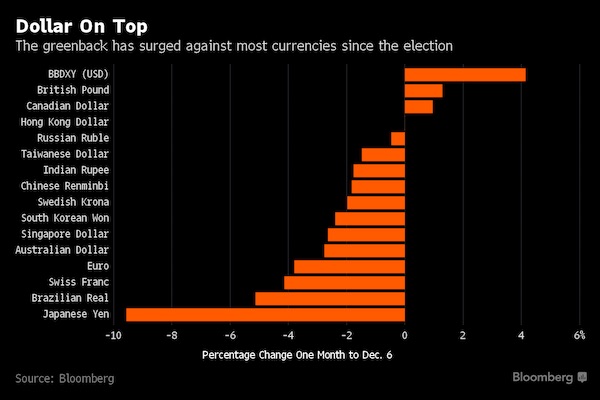

Stockman slams the whole thing. Not looking for (another) Washington job?
• Wall Street’s Calling the Sheep to the Slaughter – Again! (Stockman)
I believe the shock of Donald Trump’s election will soon be vastly exceeded by an even more shocking shutdown of Washington governance within days of the inauguration. For the first time since the 1930s there will be a crash on Wall Street and a recession on main street, but the Imperial City will be powerless to remedy either. That’s because financial history is not circular; it’s cumulative and all the fiscal and monetary artifices, expedients and frauds that can be deployed by the state to maintain the illusion of prosperity and soaring financial asset prices will have finally been exhausted. With the Fed pitifully impaled on the zero bound for 96-months running, it has become evident to even the bubble vision cheerleaders that the massive monetary stimulus of the last two decades is over and done.
The only thing left in the Fed’s arsenal is sub-zero interest rates, and that option does not have even a remote prospect of getting off the ground. Donald Trump won the election against all odds, and that he did so on the back of a populist uprising that is unmitigated bad news for Wall Street. Brandishing whatever the present day equivalent of torches and pitchforks might be, the people will surely descend en masse on the Eccles Building if the Fed even hints at the possibility of imposing negative rates on savers and retirees. Nor can the market be rescued through the backdoor of some kind of antiseptic QE that showers gamblers with unspeakable windfalls and stir the populist political pot to a full boil. The obvious dead-end of monetary policy, in fact, is why there has been such frenzied rotation to the Trump reflation trade after the election.
The idea of a massive Trump stimulus was literally invented on the spot late on election night by Wall Street operators in order to attract gullible homegamers into the casino one last time. But the smart money will soon be done selling and the unvarnished Washington disaster looming dead ahead will come screaming back into view. Even if Donald Trump had a semi-coherent economic program, which he clearly doesn’t, there is not a chance that he could get it through the Congress.

But it’s all that’s left! Shelton is another option for next Fed head.
• The Fed Shouldn’t Be Driving US Economy – Trump Advisor Judy Shelton (CNBC)
The Federal Reserve shouldn’t be driving the United States economy because monetary stimulus is quite limited, Trump economic advisor Judy Shelton told CNBC on Wednesday. “What you want is productive growth and the kind of growth that is truly stimulated by tax reform, by regulatory reform, trade reform and important infrastructure projects to upgrade our ability to be more productive as a nation,” she said in an interview with CNBC’s “Closing Bell.” That’s what President-elect Donald Trump has pledged to do when he takes office, and the market apparently likes what it’s hearing. It has been rallying since Trump’s surprising win on Nov. 8, and on Wednesday the Dow Jones industrial average and S&P 500 hit all-time highs.
However, the Fed meets next week and it is widely believed it will hike interest rates. Shelton, though, doesn’t believe a small rate increase is going to derail the rally because it is already priced in. If there is turmoil, then “things are a lot more fragile than we thought,” she said. Shelton, co-director of the Sound Money Project at Atlas Network, is known to favor the gold standard and calls the U.S. monetary system an “anti-system.” She’s also been touted by some as a good candidate to fill empty Fed spots. Jim Grant, founder and editor of Grant’s Interest Rate Observer, told CNBC recently he likes Shelton as a replacement for Chair Janet Yellen when she retires in early 2018.

It’s time someone takes a look at who’s behind the shadow banks.
• China’s Banks Are Hiding More Than $2 Trillion in Loans (WSJ)
In 2014, the Chinese city of Haimen on the mouth of the Yangtze River set out to build a large apartment complex and turned to Bank of Nanjing for about $29 million in financing. The bank was happy to oblige but it didn’t call the money a loan, according to people familiar with the matter. It was added to Bank of Nanjing’s balance sheet as an “investment receivable,” a loosely regulated category of assets that allows bank officials to set aside little or nothing for potential losses. Bank officials aren’t shy about the accounting sleight of hand, which is rampant across China. The bank had about $39 billion in investment receivables in the third quarter, nearly as big as its loan portfolio, and profits have climbed by more than 20% a year.
As of June, 32 publicly traded Chinese banks had a total of $2 trillion in investment receivables as of June, up from $334 billion at the end of 2011, according to a tally by The Wall Street Journal of the latest available information from data provider Wind. The investments are equivalent to 20% of the same banks’ total loans in dollar terms, up from 6% at the end of 2011. The 32 banks have about 70% of all the banking assets in China. The surge shows how Chinese banks are trying to keep the credit spigot open to support the country’s slowing economy. Structuring financing deals as investments instead of loans frees up bank capital and makes it easier to extend loan deadlines or new credit to borrowers. The strategy has been especially popular at small and midsize banks, said executives and analysts.
The epidemic of investment receivables has created a parallel buildup of debt in addition to China’s rising official debt levels, now 2.5 times GDP. “The rapid growth in banks’ off-balance-sheet and investment activities, in essence, means hidden credit risks and could threaten financial safety,” said Shang Fulin, China’s top banking regulator, in an unusually blunt speech in September. Economists at Swiss bank UBS estimate as much as $2.4 trillion (16.5 trillion yuan) was “missing” from the broadest measurement of credit disclosed by China’s central bank last year, up from $712 billion (4.9 trillion yuan) in 2014. The discrepancy is largely because Chinese commercial banks use so-called shadow lenders to mask loans as investments, the economists said.
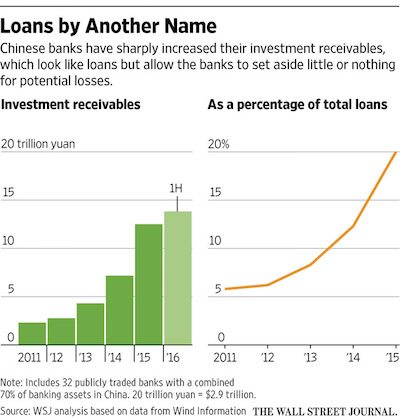

That’s a lot.
• China’s Foreign Reserves Down 25% Since 2014 (BBG)
China’s foreign currency reserves, the world’s largest, fell the most since January after the yuan declined to an eight-year low. • Reserves decreased $69.1 billion to $3.05 trillion in November, the People’s Bank of China said in a statement Wednesday • That compares with the median forecast of $3.06 trillion in a Bloomberg survey of economists • Decline was biggest since reserves tumbled $99.5 billion in January • The fifth-straight monthly decline brings the reduction in the stockpile to almost $1 trillion from a record $4 trillion in June 2014. While authorities have begun tightening capital controls, a $50,000 limit that Chinese citizens are allowed to convert from yuan annually will reset at the start of the new year, potentially adding depreciation pressure on the currency.
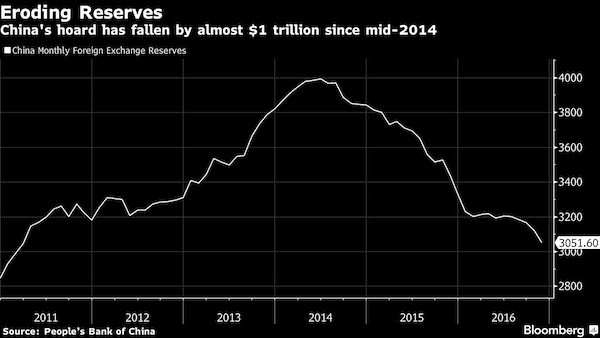
“Containing capital outflows is the key to keeping China’s systematic risk in check,” Harrison Hu, chief greater China economist at RBS in Singapore, wrote in a note. “Market turmoil one year earlier showed the strong feedback loop between capital flight and currency depreciation can destabilize China’s financial system and lead to escalating systemic risk.” “A combination of yuan weakness and a peak in the mainland property sector is conspiring to increase capital outflows,” Bloomberg Intelligence economists Tom Orlik and Fielding Chen wrote in a report. “Another month of falling reserves does little to inspire confidence, especially as households await the renewal of their FX quota at the start of 2017. Even so, with the yuan steady so far in December and capital controls in place, there’s reason to hope China’s reserve buffer will end the year on a more stable note.”

The teapots are full. Also, at some point capital flight and foreign reserves will become part of this.
• China: World’s Top Oil Market Is Starting to Lose Its Sheen (BBG)
One of the biggest engines soaking up the world’s oil is starting to sputter. Growth in crude imports by China, the second largest consumer after the U.S., will probably slow by more than 60% in 2017, according to a Bloomberg survey of analysts including FGE and Energy Aspects. Private refiners that helped boost purchases to record levels are expected to be constrained by tighter licenses and increased scrutiny on their taxes. At the same time, the current space available for stockpiles may run out. While OPEC’s deal to curb output may help erode a glut and lift prices, Chinese imports remain key for any sustained recovery. It’s the biggest buyer in Asia, the world’s top oil market, and its insatiable appetite was a significant driver for crude’s climb to more than $100 a barrel in the past decade.
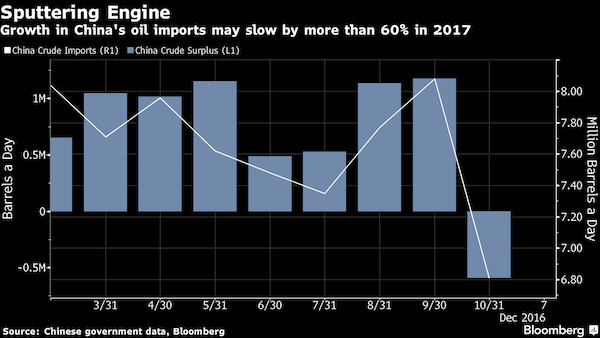
[..] Concern about teapots’ creditworthiness and lack of experience in international trade are challenges, while the implementation of higher fuel-quality standards could force some to shut. The Chinese government has signaled its intention to slow new quota approvals as it assesses whether the teapots made good on their pledges to close outdated refining units or build storage facilities, according to JPMorgan, which predicts the Asian nation’s oil imports may stop expanding in 2017. Stockpiling may also slow. In 2016, a lot of China’s imports went into oil storage, said Amy Sun, an analyst with ICIS-China. “Going into next year, due to the slow construction of new capacity and already full tanks in current facilities, there will be limited space for further growth.”

“..the Government cannot run out of money, and at times like this — when it saves instead of spending — the only thing that can make the economy grow is if we do the borrowing. And, unlike the Government, we as individuals can — and will — run out of cash.”
• The Great ‘Living Within Our Means’ Con (Abc.au)
The greatest lie ever sold is that the Australian Government can run out of Australian dollars. This is exactly the lie Treasurer Scott Morrison wants you to believe as he rolls out the same old deception — deficit bad, surplus good — ahead of next year’s budget. Social Services Minister Christian Porter is relying on this myth as he tries to sell more cuts to the dole and other welfare benefits: by giving voters the impression that welfare bludgers are sending the country broke and that they have to be made to suffer in the cause of “budget repair”. If you feel like there is a disconnect between your bank balance and what you see and hear on television, you are not taking crazy pills.
“Smashed avo” commentators like Bernard Salt paint everyone from Generation X through to “The Millennials” as ingrates who are incapable of saving, while the Government takes a victory lap claiming 25 years of “unprecedented economic growth”. In reality, Australia is experiencing its first quarter of negative economic growth in five years and the weakest wage growth since the last recession. Official figures released yesterday by the ABS showed a 0.5% contraction in seasonally-adjusted GDP growth for the September quarter, dragging the yearly growth number down to 1.8%. The figures fell well shy of market expectations, with Bloomberg having forecasted a 0.1% contraction over the third quarter down from its previous forecast of 0.2% growth. For its part, the RBA has kept the official cash rate on hold again this week.
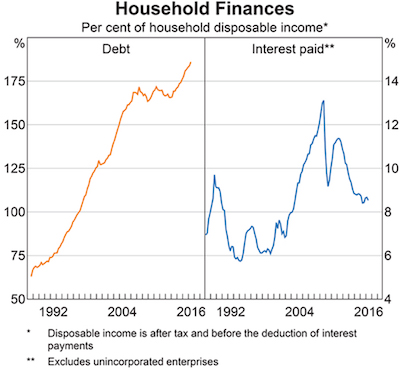
The ratio of disposable income to debt for households (released November 2, 2016). (ABS, RBA)
Meanwhile, homes are less affordable, jobs are less secure, a growing number of people are forced into part-time work, and more and more people are struggling to pay their bills and must therefore cope with a greater burden of debt. “There are more than 15% of willing labourers not working in one form or another,” economist Professor Bill Mitchell said. Saying things like “we have to live within our means” is telling voters the Government — which issues the dollar — can run out of its own money. But this is literally impossible. Our means as a country are limited to what we can produce using our effort, our skills and our technology. The Government cannot spend without limit, or it will cause inflation. But the Government cannot run out of money, and at times like this — when it saves instead of spending — the only thing that can make the economy grow is if we do the borrowing. And, unlike the Government, we as individuals can — and will — run out of cash.

Not enough space here to do Bill Mitchell justice. Thorough.
• Australia Inexorably Marching Towards Recession (Mitchell)
The following graph shows the quarterly percentage growth in real GDP over the last five years to the September-quarter 2016 (blue columns) and the ABS trend series (red line) superimposed. Growth was negative in the September-quarter 2016 – minus 0.5% (annualised minus 2%). The annual growth figure of 1.8% is down from 3.1% in the June-quarter and shows how far the economy has slipped. It is now well below trend growth and well below the figure required to maintain stable unemployment (much less reduce it). The annualised growth from this quarter (if continued) means Australia will enter a deep and totally unnecessary recession that has been chosen by the Federal Government, which claims it is intent on pursuing a fiscal surplus.
The automatic stabilisers are already working against that and the ABS announced yesterday that Taxation revenue fell a further 15.3% in the September-quarter against a very small increase in spending. In the June-quarter, it was the large boost in public sector infrastructure spending that saved the economy from negative growth such was the overall weakness of non-government spending. As we will see soon, that contribution turned negative and so went the aggregate growth position. While exports continued to grow (with an uptick in the terms of trade), the external sector overall subtracted from growth. Add to that the fact that domestic wages growth is flat and household indebtedness is at record levels and you have a fairly sober outlook.
If the government sector persists in implementing its planned spending cuts then recession looms for the Australian economy. The graph clearly shows that the trend has been downwards for 4-quarters now and will hit zero by the time we learn about the current December-quarter data unless there is a dramatic shift in government policy. It must announce renewed stimulus or face recession.
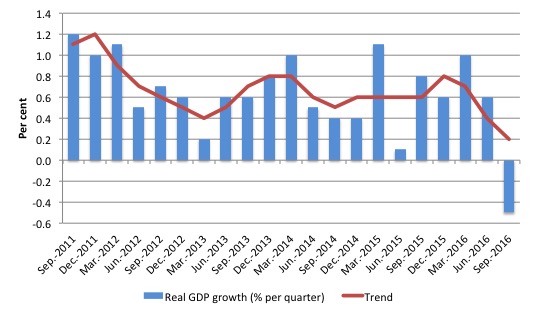
The following graph presents quarterly growth rates in trend GDP and hours worked using the National Accounts data for the last five years to the September-quarter 2016. You can see the major dislocation between the two measures that appeared in the middle of 2011 persisted throughout 2013 and has reasserted itself in recent quarters. The GDP growth has driven by capital-intensive exports and more recently, capital infrastructure growth, which is one reason why labour productivity growth had been strong and employment growth weak. Just in case you think the labour force data is suspect, the hours worked computed from that data is very similar to that computed from the National Accounts.
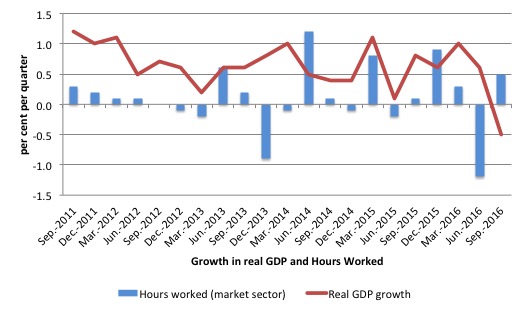

Hard to keep track of this circus.
• Federal Judge Effectively Ends Recount In Michigan (BBG)
A recount of presidential election ballots in Michigan was effectively halted after a federal judge deferred to a state court finding that losing Green Party candidate Jill Stein wasn’t an “aggrieved person.” U.S. District Judge Mark A. Goldsmith in Detroit ruled Monday that the recount could proceed, then reversed himself Wednesday after Republican backers of President-elect Donald Trump persuaded a state appeals panel that Stein wasn’t qualified to initiate the process because she had no chance of winning the election. Stein’s lawsuit was based on claims of potential hacking of electronic voting machines and reports of foreign interference in the election, particularly by Russia.
Stein has “not presented evidence of tampering or mistake,” Goldsmith wrote in Wednesday’s ruling. Instead, she has made “speculative claims going to the vulnerability of the voting machinery – but not actual injury,” he said. Stein’s attorneys had argued the Michigan Court of Appeals misinterpreted state law when it accepted a claim by state Attorney General Bill Schuette, a Republican, that Stein couldn’t petition for a recount because she wasn’t an “aggrieved person.” Goldsmith wrote that he was obligated to follow Michigan law, which permits a recount to an “aggrieved” candidate who stands a reasonable chance of winning an election “but for mistake or fraud.”

Someone has to say it.
• Boris Johnson: Saudi Arabia, Iran ‘Puppeteers’ In Middle East Proxy Wars (G.)
Boris Johnson accused Saudi Arabia of abusing Islam and acting as a puppeteer in proxy wars throughout the Middle East, in remarks that flout a longstanding Foreign Office convention not to criticise the UK’s allies in public. The foreign secretary told a conference in Rome last week that the behaviour of Saudi Arabia, and also Iran, was a tragedy, adding that there was an absence of visionary leadership in the region that was willing to reach out across the Sunni-Shia divide. At the event, Johnson said: “There are politicians who are twisting and abusing religion and different strains of the same religion in order to further their own political objectives. That’s one of the biggest political problems in the whole region. And the tragedy for me – and that’s why you have these proxy wars being fought the whole time in that area – is that there is not strong enough leadership in the countries themselves.”
The foreign secretary then identified Saudi Arabia and Iran specifically, saying: “That’s why you’ve got the Saudis, Iran, everybody, moving in, and puppeteering and playing proxy wars.” Johnson’s criticism of Saudi Arabia came as Theresa May returned from a prestigious two-day visit to the Gulf in which she lauded both the Saudi royal family for its visionary leadership, and the value of the 100-year-old alliance with the UK. Foreign Office ministers, aware of Saudi sensitivity to criticism and the strategic importance of the Gulf relationship, usually soft-pedal and focus on their path to reform. [..] The British defence industry is also heavily dependent on arms contracts with the Gulf states, and the Royal Navy has established a major naval base in Manama, the capital of Bahrain. Johnson is due to visit the region this weekend, when he will have to explain why he thinks the Gulf states are abusing Islam for political ends.

It just goes on. And then one day this will not end well.
• General Strike Shuts Down Greece on Thursday (R.)
Greeks went on strike on Thursday to protest planned labor reforms and painful austerity cuts demanded by the country’s EU and IMF lenders as part of a crucial bailout review. Passenger ships remained docked at ports, city transport was disrupted and local administration offices shut down as workers joined the 24-hour nationwide walkout called by the country’s largest private and public sector unions, GSEE and ADEDY. “The burden we carry is already unbearable,” said GSEE in a statement, calling lenders’ demands “irrational”. “The downturn must finally end,” its rally poster read. Workers and pensioners will march in central Athens later in the day. Turnout in street protests has been low since Greece signed up to a third international bailout in July 2015 after tough negotiations that almost forced it out of the eurozone.
Eurozone finance ministers said on Monday that Athens and its lenders needed to speed up the review which has hit a snag on labour reforms, including liberalising mass layoffs and reviving collective bargaining between employers and unions. Energy reforms and measures to plug a projected fiscal gap in 2018, when Greece’s bailout program expires, are also among thorny issues in the review which may resume next week. Prime Minister Alexis Tsipras hopes a deal can be reached by the end of the year for the country’s bonds to be included in the ECB’s bond buying program by March 2017. [..] In parliament, lawmakers debated more tax hikes and spending cuts as part of next year’s budget, which projects the economy will grow by 2.7% and attain a 2% of GDP primary surplus – excluding debt servicing costs.

The peaks of NIMBY.
• EU To Set Greece Deadline For Forced Return Of Asylum Seekers (Pol.)
The European Commission will set Greece a deadline on Thursday to fix its migration system and resume taking in asylum seekers from March next year, which would put an end to its six year-long exemption from the EU’s “Dublin rules” on asylum. Under an agreement signed in the Irish capital in 1990, member countries which are the first point of entry for people seeking asylum in the EU have an obligation to process their application, and take them back if they have travelled on to other EU countries without authorization. Transfers from other EU countries to Greece were suspended in 2011, however, after the European Court of Justice and the European Court of Human Rights ruled that conditions in Greek facilities for asylum seekers were unacceptable.
A new 17-page proposal from the Commission, set to be adopted on Thursday and obtained by POLITICO, says: “It is recommended that the transfer of asylum applicants to Greece … should be resumed.” Forcing Greece to assume its responsibilities is part of a wider effort to reduce controls at many of the EU’s internal borders that were reintroduced in response to the refugee crisis, causing the temporary suspension of Schengen, the passport-free travel zone. Countries that reimposed border controls, such as Austria, Germany and Denmark, are likely to only remove them if they can send back asylum seekers to the country where they first set foot in the EU. The current state of the Dublin system will be on EU leaders’ agenda at their summit in Brussels next week.
Prior to that, their interior ministers meet on Friday to discuss arrangements for dealing with asylum seekers, as well as a controversial Commission proposal for a permanent relocation system in the event of unusually high levels of refugee arrivals. The Greek government has its work cut out if it is to respond to the Commission’s request for a report by mid-February on improvements in the standard of accommodation for asylum seekers and the management of the asylum process. “In terms of quality, many of the reception facilities in Greece still fall short of the requirements,” says the Commission document, adding that there are particular problems on the Aegean islands, where reception centers “are not only overcrowded but have substandard material conditions in terms of sanitation and hygiene.”

Instability is the key word.
• Greenland’s Ice-Free Past Exposes Sea Level Rise Danger (AFP)
The massive Greenland ice sheet has melted away at least once during the last 1.4 million years, according to a study published on Wednesday, raising fears that manmade climate change could provoke dangerous sea levels. Bedrock samples retrieved through more than three kilometres (two miles) of ice reveal for the first time that the island’s surface was exposed directly to the atmosphere in the not-so-distant past. It may have been a single period of up to 280,000 years, or several shorter ones, researchers reported in the journal Nature. But either way the evidence shows that the island was largely ice-free. “Unfortunately, this makes the Greenland ice sheet look highly unstable,” said lead author Joerg Schaefer, a palaeoclimatologist at Columbia University in New York.
Covering an area larger than France, Spain and Germany combined, the northern hemisphere’s largest ice block on land is kilometres thick and holds enough frozen water to lift the world’s oceans by more than seven metres (24 feet). Even a couple of metres would swamp cities that are home to hundreds of millions of people and planted with many of the crops that feed them. Hence the sense of urgency among climate scientists trying to figure out just how sensitive the ice sheet is to global warming, which has already pushed temperatures in the Arctic region 2ºC (3.6ºF) above pre-industrial era levels – twice the global average. The rate of Greenland’s ice loss has doubled since the 1990s. In the last four years alone, the ice sheet has shed more than a trillion tonnes of mass, according to earlier research.

“..giraffes are war fodder, a large animal, extremely curious that can feed a lot of people..”
• Giraffes Face ‘Silent Extinction’ (BBC)
A dramatic drop in giraffe populations over the past 30 years has seen the world’s tallest land mammal classified as vulnerable to extinction. Numbers have gone from around 155,000 in 1985 to 97,000 in 2015 according to the International Union for the Conservation of Nature (IUCN). The iconic animal has declined because of habitat loss, poaching and civil unrest in many parts of Africa. Some populations are growing, mainly in southern parts of the continent. Until now, the conservation status of giraffes was considered of “least concern” by the IUCN. However in their latest global Red List of threatened species, the ungainly animal is now said to be “vulnerable”, meaning that over three generations, the population has declined by more that 30%.
According to Dr Julian Fennessy, who co-chairs the IUCN giraffe specialist group, the creatures are undergoing a “silent extinction”. “If you go on a safari, giraffes are everywhere,” he told BBC News. “While there have been great concern about elephants and rhinos, giraffes have gone under the radar but, unfortunately, their numbers have been plummeting, and this is something that we were a little shocked about, that they have declined by so much in so little time.” The rapid growth of human populations has seen the expansion of farming and other forms of development that has resulted in the fragmentation of the giraffe’s range in many parts of Africa. But civil unrest in parts of the continent has also taken its toll. “In these war torn areas, in northern Kenya, Somalia, and Ethiopia in the border area with South Sudan, essentially the giraffes are war fodder, a large animal, extremely curious that can feed a lot of people,” said Dr Fennessy.









Home › Forums › Debt Rattle December 8 2016